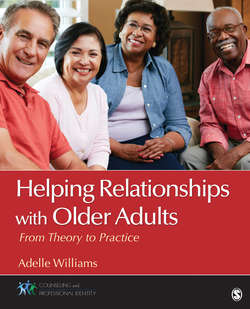Читать книгу Helping Relationships With Older Adults - Adelle M. Williams - Страница 90
На сайте Литреса книга снята с продажи.
Attributes Needed for Success With Older Adults
ОглавлениеOlder Americans are not easily categorized. Their needs and preferences are varied and becoming more so. There are a number of personal attributes (Spar & LaRue, 1997) that practitioners should either amplify or adopt for success with older adults. Such attributes include the following:
Comfort with broad-based rather than narrowly focused interventions
Appreciation for the social factors in older people’s health and well-being
Remaining an activist in the face of degenerative or terminal disease
Patience for the time required and complexity encountered with seniors
Lack of embarrassment when confronted with one’s youth and inexperience
Comfort in collaboration with family and other providers (shared authority)
Focus on function, rehabilitation, and quality of life rather than on survival
Capacity to anticipate the older adult’s needs and advocate for care
Examining various causes of illness and disability
Appreciation for cultural as well as physiological diversity
Awareness of greater hetereogeneity among the aged (flexibility)
Willingness to physically interact (touch) and give concrete health advice
Capacity to tolerate dependency yet press for optimum autonomy
Ability to lead as well as follow in the person’s care and decisions
Ongoing commitment to clinical education
Additionally, it should be noted that older clients may not wish to speak with a counselor. Older clients may approach the helping professionally independently of others, they may be accompanied or coerced by family members to meet with a helping practitioner, or a crisis may require a referral by another concerned professional. Reluctance by resistant clients can be overcome by creating an atmosphere of trust, openness, and respect for the older client, while simultaneously conveying knowledge of the issues that he or she faces.
It is clear from the earlier discussions of aging issues that age-related problems exist and will continue to exist. The probability of increased physical and mental health or emotional issues may occur with major life transitions. These age-related problems need not be viewed as impediments to the helping relationship; they should instead be viewed as opportunities to learn strategies to circumvent the challenges. Older adults are capable of successful aging. They are resilient and are able to maintain an exceptional quality of life with increased health and engagement with others. However, mental health practitioners may need to assist this group in developing these characteristics. This requires such attributes as being flexible and open, understanding, and collaborative and having an ongoing commitment to clinical education and the well-being of older clients. Together, older adults and their mental health practitioners can ensure a good relationship and realize the goal of successful aging.
